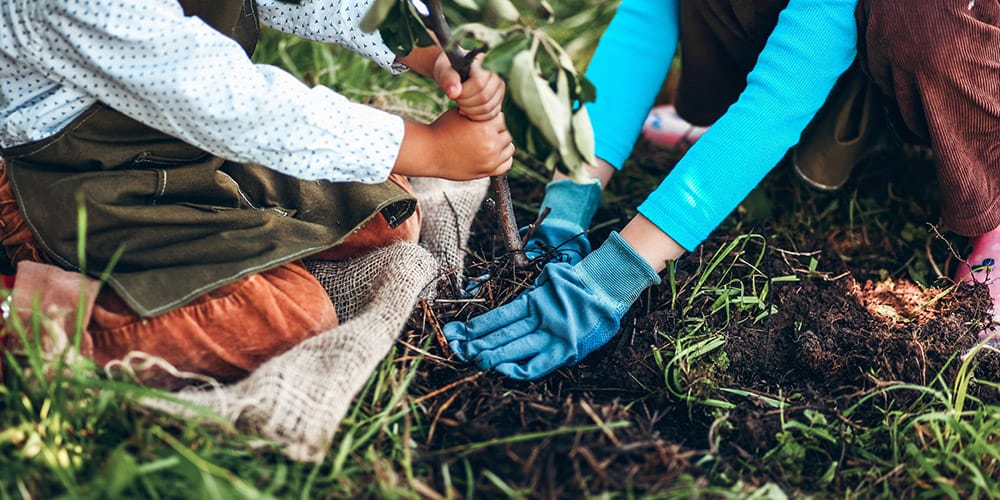If you have plants or trees in your yard, you are already making a positive difference for the environment. Through the process of photosynthesis, your plants and trees remove carbon dioxide — one of the greenhouse gases responsible for global warming — from the atmosphere, helping to cool the planet.
But your landscape’s potential to support a more sustainable future doesn’t stop there. Here are a few more ways you can help.
Choose Native Plants
Plants play a major role in the sustainability of your landscape, and selecting plants that are native to your region is key. Native plants are particularly well-suited for the temperature, weather and soil conditions in your area, which means they require less watering and will thrive without the use of chemical pesticides and fertilizers. They also help preserve a natural, healthy habit for local wildlife.
If your native plants aren’t thriving as well as they should, try soil amendments, such as Agromend or Economix. Soil amendments introduce healthy nutrients and microbes into the soil to help promote plant growth.
Modify Your Lawn Care
Without careful planning, maintaining a lush, green lawn can require a considerable amount of water. To keep your lawn green without as much water, try using Turf Rescue. Turf Rescue improves the water retention and permeability of your soil, while reducing evaporation.
If you aren’t attached to your lawn, you can also save water by replacing some or all of your conventional grass with other landscape elements. Native low-growing grasses, flowers, vegetable gardens and hardscape elements all make great, water-saving alternatives to a traditional lawn.
Another option many people consider is artificial turf. Keep in mind, however, that while synthetic grass does eliminate the need for watering, the manufacturing process is energy intensive and contributes to carbon emissions.
Avoid Chemical Herbicides and Pesticides
If pests or weeds are taking over your garden, it can be tempting to douse the entire thing in a chemical herbicide or pesticide. But this environmentally damaging practice actually isn’t necessary. In many cases, weeding the old-fashioned way, choosing native plants and introducing beneficial insects into your garden is enough to put an end to unwanted pests and plants. There are also natural herbicides and pesticides made without harmful chemicals. Different types of pests and weeds require different solutions, but with a little research, there is almost always an earth-conscious way to handle the problem.
Use Soil Products Made From Recycled Organic Material
What happens to organic waste — such as lawn clippings, leaves and food — when we throw it away? All too often, it ends up in a landfill, where it breaks down over time, releasing greenhouse gases in the process. But there is another option. Organic waste can be transformed into soil products through composting, a process that prevents the release of methane (a powerful greenhouse gas) as organic matter breaks down.
Along with saving space in landfills and helping cool the planet by reducing greenhouse gas emissions, recycled soil products — such as Agromin’s Compost 100™ — benefit the environment because they absorb moisture more effectively, helping to reduce runoff. They also help keep your plants healthy and provide an environmentally friendly alternative to chemical fertilizers, which can pollute groundwater and harm local ecosystems.
Be Rain Ready
In addition to using organic soil products that naturally absorb water and prevent runoff, you can conserve water by planning your hardscape to account for rain. For example, avoid concrete walkways and driveways. The dense concrete doesn’t absorb water, allowing rain to down to storm drains (which contributes to water pollution) or simply puddle up and evaporate. Instead, choose absorbent materials like pea gravel or decomposed granite to allow water to seep through. You can also use mulch, such as our Walk-On Bark, to create permeable pathways.
Want to go a step further? Consider adding a decorative rain barrel to your hardscape design and using the water you collect for your future gardening needs.
Want to learn more about the benefits of composting and how organic soils and mulches can benefit your landscape? Your friends at Agromin are always eager to help. Contact us today!

